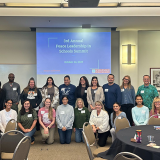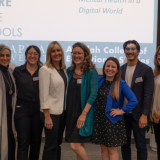
Nurturing Independence: How Parents Can Support Their College-Bound Future Educator Message from the Dean
August 15, 2024
Dear Attallah College Families,
Sending your child off to college is an exhilarating and bittersweet moment for any parent. As the parent of an aspiring educator, you have an incredible opportunity to foster your child’s growth and independence during their college journey. While your love and support are invaluable, it is equally important to strike a balance and allow them to navigate their own path. Since the pandemic and with the increases in ‘connectivity’ between parents and children through technology, our faculty and I have seen our college students in recent semesters face greater challenges in their transition to their new role as adult learners. I’d like to highlight our recommendations for how you can best support your college-bound future educator as they join us in this new phase of their development.
1. Encourage Independence
College is a crucial period for personal growth and self-discovery. As parents, your role evolves from being daily providers of basic necessities to becoming trusted personal guides. Encourage your child to take ownership of their academic and personal responsibilities. Allow them to make decisions, solve problems, and learn from their mistakes. This process of independence will empower them to develop essential skills for their future teaching career. When asked how you would approach a situation, rather than supplying easy answers, ask questions like, “What do you think you should do?” When something goes wrong (and it should – they are learning to adult!), help your student to examine the situation, their choices, and ways they will learn from the experience and do things differently in the future.
2. Foster Self-Advocacy
Educators must be advocates for themselves and their students. Encourage your child to develop self-advocacy skills by personally engaging with professors, seeking academic support when needed, and actively participating in campus activities. By fostering self-advocacy, you are preparing them for the responsibilities they will have as teachers, ensuring they can effectively support and empower their own future students. Additionally, understand that all college students – even those under the age of 18 – are considered ‘educationally emancipated’ and are expected to independently interact with faculty members in discussions regarding their academics.
3. Provide Emotional Support
Transitioning to college life can be overwhelming for many students, and your emotional support can make all the difference. Listen to their concerns, fears, and triumphs. Offer encouragement, reassurance, and a sympathetic ear when they face challenges, and let them know that you understand that mistakes will be made along the way yet it’s their job to seek solutions during hard times. Knowing that they have a strong support system will give them the confidence to persevere and grow.
4. Promote Work-Life Balance
Teaching is a demanding profession that requires a healthy work-life balance. Help your child establish healthy habits early on. Encourage them to manage their time wisely, prioritize self-care, and engage in activities that bring them joy and relaxation. With that said, college-level academic work requires more consistent and intense engagement than high school and setting aside specific time in one’s schedule for daily reading/studying is necessary to prevent cramming and all-nighters later. Modeling a balanced lifestyle will reinforce the importance of self-care and help them avoid burnout in their future careers. In turn, modeling what you as a parent are doing to maintain your work-life balance as you move into this new stage of having a college-attending child is important.
Behaviors that undermine your child’s college success
1. Micromanagement
While it’s natural to be concerned about your child’s well-being, resist the urge to micromanage their college experience. Trust that they will make responsible decisions and allow them the freedom to learn from their own choices. Remember, mistakes are often valuable learning opportunities. Know that there are academic resources within Chapman to which students can turn for help rather than to parents as they did in K-12; we have a Writing Center, free tutoring, Grammarly Premium, an outstanding library staff, and a Tech Hub – in addition to their faculty and peers – ready to assist them.
2. Overstepping Boundaries
It’s important to recognize that your child is transitioning into adulthood during their college years. Respect their privacy, avoid excessive monitoring, and refrain from interfering in their personal relationships or academic affairs. Allow them the freedom to establish their own identity and make their own choices, including what information they share with you. In recent years, we have seen the acculturation of parents to access to their child’s online gradebook, as was given in K-12 schools, to be a significant detriment to their child’s becoming an independent college student. Additionally, it is against official Chapman policy for a student to give their login to Chapman’s electronic systems (including our Learning Management System, Canvas) to anyone. To prepare for life beyond the classroom, students must learn to keep their own calendars, meet deadlines, and be aware of their performance at all times – allow them to do that from Day One and provide your guidance on how to do so successfully.
3. Solving Their Problems
College is a time for students to develop problem-solving skills. Avoid stepping in to solve every challenge or difficulty they encounter. Instead, encourage them to seek guidance from campus resources, such as academic advisors and professors as well as our amazing support staff. This approach empowers them to develop critical thinking skills and become more self-reliant. Our faculty hold office hours weekly and expect students to come for help and for mentorship – encourage your student to visit every faculty member during office hours early in the semester so they are comfortable doing so later if they have a challenge and need guidance.
Your role as parent of a college student, while different from their time in K-12 schools, is equally important now to their success as ever before. Remember, the best gift you can give your child is the confidence to navigate their own path and become the best version of themselves, and we in Attallah College will do all we can to support their success while at Chapman and in their future careers. We look forward to embarking on this journey with your students this year.
Roxanne Greitz Miller, Ed.D.
Dean of Attallah College of Educational Studies
Donna Ford Attallah Professor of Teacher Education

